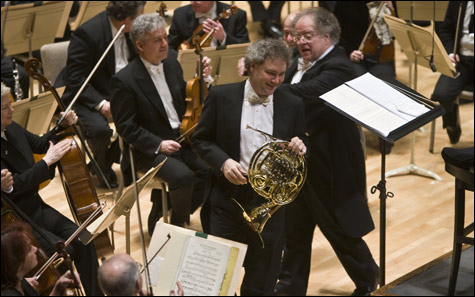
WHEW! The Symphony Hall Carter celebration ended with BSO principal horn James Sommerville in a moving performance of the Horn Concerto. |
Living for a century is still a milestone; for a great and still-productive artist to do so is virtually unheard of. So there's a special satisfaction in celebrating this latest of Elliott Carter's achievements. And since this last year was already Carter's hundredth, in anticipation of his actual birthday on December 11, festivities have abounded all year long. Last summer's Festival of Contemporary Music at Tanglewood was devoted entirely to Carter: nine concerts over five days, nearly 50 works, two world premieres among them, performed by admired stars, young artists on the rise, and gifted students, with Carter very much in attendance.
Boston Symphony Orchestra music director James Levine, a great Carter advocate, was the central force in planning that tribute, but kidney surgery precluded him from participating. So other Carter specialists (like composer/conductor Oliver Knussen) led the BSO (in its first all-Carter program) and the Tanglewood Music Center Orchestra in some of Carter's most ambitious but still seldom-played orchestral works, like the Concerto for Orchestra and Symphonia. Celebrated pianists/Carter commissioners Ursula Oppens and Charles Rosen played major keyboard pieces. (At a Boston Conservatory Piano Masters concert last month, in connection with her new Cedille recording, Oppens played one new piece shy of Carter's complete solo piano music.) And there were, of course, many chamber pieces.

Carter's extraordinary vocal music was particularly in evidence. His lone opera, What Next?, was screened from a new DVD. There were his complex and compelling settings of Elizabeth Bishop and John Ashbery, the latter in the daunting Syringa and the premiere of a witty new sequence of a cappella songs with the punning title Mad Regales. (Carter loves to manipulate words almost as much as he loves to play with notes.) There were settings of three great 20th-century Italian poets, Giuseppe Ungaretti, Salvatore Quasimodo, and Eugenio Montale (in a cycle called Tempo e Tempi — "Time and Tempos"). There was Wallace Stevens at his most introspective and retrospective in the recent In the Distances of Sleep, Carter's most personal and autumnal and perhaps most beautiful song cycle; it was sung with heartbreaking intensity by the young Metropolitan Opera mezzo-soprano Kate Lindsey. There were also two panel discussions by Carter scholars and performers, plus Richard Dyer interviewing the Man Himself. Nine musical programs filled Ozawa Hall and the Chamber Music Hall to near capacity. It was one of the most phenomenal tributes to a single composer ever assembled.
In Boston, closer to Carter's birthday, New England Conservatory flutist/composer John Heiss coordinated "Elliott Carter: Lifeworks at 100," a joint celebration at NEC, the Longy School of Music (where Carter studied music while he was an English major at Harvard), the Isabella Stewart Gardner Museum, and Symphony Hall. At Longy, the highlight of a concert by the Pacifica Quartet was Carter's Pulitzer-winning Third String Quartet. (My review was in the November 28 Phoenix; the second of the Pacifica's two-CD Carter-quartet series on Naxos will be out in February.) At the Gardner, the young cellist and pianist who played Carter's 1948 Cello Sonata, one of his career's major turning points, were perhaps too young to understand that his tunes came out of '40s pop music and his rhythms out of jazz and swing (cello pizzicatos sounding like a double bass). NEC's Laurel Quartet did better by his 1995 String Quartet No. 5 (though not every startling shift in tone was clearly demarcated). The superb Claremont Trio, with the violist and second violinist of the Borromeo String Quartet, did an elegant, supremely sophisticated version of Carter's shifty 1997 Piano Quintet.
Four concerts at NEC included 16 works (many earlier pieces, to counterbalance the Tanglewood emphasis on later works), a master class, and a panel discussion with Carter. (I was sorry to miss Stephen Drury, Yukiko Takagi, and the Callithumpian Consort in Carter's Double Concerto; several trusted informants were bowled over.) In a staggering performance of Carter's overwhelming First Quartet (1951), the greatest 20th-century American work in that genre (and maybe not just American), the Borromeo String Quartet captured (and liberated) not only the marvelous sounds inspired by the Arizona desert near where Carter was then living — the whirring, scurrying Allegro scorrevole and the mysterious, heart-stopping/time-stopping night world of the Adagio — but also the questions of existence and perception (and self-perception) they pictorialize. Instead of paper scores, the Borromeos now use laptops, which allow them to see not just their individual parts but the full interplay of a complete score.
Next night, cellist and former NEC president Lawrence Lesser and pianist Christopher Taylor gave a profound and masterful reading of the Cello Sonata, with all its soaring tunefulness and intricate cross-rhythms, Carter's first unquestioned masterpiece in his exploration of the technique of "metrical modulation," in which contrary sound worlds — metronomic piano and rhapsodic, almost Brahmsian cello — go continually in and out of synch.